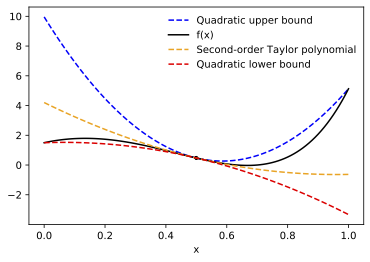Ecosyste.ms: Awesome
An open API service indexing awesome lists of open source software.
https://github.com/google/autobound
AutoBound automatically computes upper and lower bounds on functions.
https://github.com/google/autobound
autodiff interval-arithmetic jax
Last synced: about 1 month ago
JSON representation
AutoBound automatically computes upper and lower bounds on functions.
- Host: GitHub
- URL: https://github.com/google/autobound
- Owner: google
- License: apache-2.0
- Created: 2022-11-23T05:09:04.000Z (about 2 years ago)
- Default Branch: main
- Last Pushed: 2024-06-28T14:48:16.000Z (6 months ago)
- Last Synced: 2024-10-02T12:07:36.707Z (3 months ago)
- Topics: autodiff, interval-arithmetic, jax
- Language: Python
- Homepage:
- Size: 509 KB
- Stars: 355
- Watchers: 10
- Forks: 19
- Open Issues: 6
-
Metadata Files:
- Readme: README.md
- Contributing: CONTRIBUTING.md
- License: LICENSE
Awesome Lists containing this project
README
# AutoBound: Automatically Bounding Functions


AutoBound is a generalization of automatic differentiation. In addition to
computing a Taylor polynomial approximation of a function, it computes upper
and lower bounds that are guaranteed to hold over a user-specified
_trust region_.
As an example, here are the quadratic upper and lower bounds AutoBound computes
for the function `f(x) = 1.5*exp(3*x) - 25*(x**2)`, centered at `0.5`, and
valid over the trust region `[0, 1]`.

The code to compute the bounds shown in this plot looks like this (see [quickstart](https://colab.research.google.com/github/google/autobound/blob/main/autobound/notebooks/quickstart.ipynb)):
```python
import autobound.jax as ab
import jax.numpy as jnp
f = lambda x: 1.5*jnp.exp(3*x) - 25*x**2
x0 = .5
trust_region = (0, 1)
# Compute quadratic upper and lower bounds on f.
bounds = ab.taylor_bounds(f, max_degree=2)(x0, trust_region)
# bounds.upper(1) == 5.1283045 == f(1)
# bounds.lower(0) == 1.5 == f(0)
# bounds.coefficients == (0.47253323, -4.8324013, (-5.5549355, 28.287888))
```
These bounds can be used for:
* [Computing learning rates that are guaranteed to reduce a loss function](https://colab.research.google.com/github/google/autobound/blob/main/autobound/notebooks/safe_learning_rates.ipynb)
* [Upper and lower bounding integrals](https://colab.research.google.com/github/google/autobound/blob/main/autobound/notebooks/bounding_integrals.ipynb)
* Proving optimality guarantees in global optimization
and more!
Under the hood, AutoBound computes these bounds using an interval arithmetic
variant of Taylor-mode automatic differentiation. Accordingly, the memory
requirements are linear in the input dimension, and the method is only
practical for functions with low-dimensional inputs. A reverse-mode algorithm
that efficiently handles high-dimensional inputs is under development.
A detailed description of the AutoBound algorithm can be found in
[this paper](https://arxiv.org/abs/2212.11429).
## Installation
Assuming you have [installed pip](https://pip.pypa.io/en/stable/installation/), you can install this package directly from GitHub with
```bash
pip install git+https://github.com/google/autobound.git
```
or from PyPI with
```bash
pip install autobound
```
You may need to [upgrade pip](https://pip.pypa.io/en/stable/installation/#upgrading-pip) before running these commands.
## Testing
To run unit tests, first install the packages the unit tests depend on with
```bash
pip install autobound[dev]
```
As above, you may need to [install](https://pip.pypa.io/en/stable/installation/) or [upgrade](https://pip.pypa.io/en/stable/installation/#upgrading-pip) `pip` before running this command.
Then, download the source code and run the tests using
```bash
git clone https://github.com/google/autobound.git
python3 -m pytest autobound
```
or
```bash
pip install -e git+https://github.com/google/autobound.git#egg=autobound
python3 -m pytest src/autobound
```
## Limitations
The current code has a few limitations:
* Only JAX-traceable functions can be automatically bounded.
* Many JAX library functions are not yet supported. What _is_
supported is bounding the squared error loss of a multi-layer perceptron or convolutional neural network that uses the `jax.nn.sigmoid`, `jax.nn.softplus`, or `jax.nn.swish` activation functions.
* To compute accurate bounds for deeper neural networks, you may need to use
`float64` rather than `float32`.
## Citing AutoBound
To cite this repository:
```
@article{autobound2022,
title={Automatically Bounding the Taylor Remainder Series: Tighter Bounds and New Applications},
author={Streeter, Matthew and Dillon, Joshua V},
journal={arXiv preprint arXiv:2212.11429},
url = {http://github.com/google/autobound},
year={2022}
}
```
*This is not an officially supported Google product.*